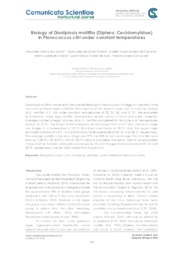Biology of Diadiplosis multifila (Diptera: Cecidomyiidae)in Planococcus citri under constant temperatures.
Biology of Diadiplosis multifila (Diptera: Cecidomyiidae)in Planococcus citri under constant temperatures.
Author(s): SANTOS, A. M. dos; OLIVEIRA, J. E. de M.; CARVALHO, A. N. M. de; OLIVEIRA, M. D. de; ASSIS, C. P. O. de; LOPES, F. S. C.
Summary: Diadiplosis multifila was recently discovered feeding on Planococcus citri eggs in vineyards in the semi-arid northeast region of Brazil. The objective of the present paper was to study the biology of D. multifila in P. citri under constant temperatures of 22, 25, 28, and 31 °C. We evaluated its embryonic stage, egg viability, development period, survival of larva and pupa, longevity, average number of eggs, and sex ratio. D. multifila completed its life cycle in all temperatures except for 31 °C. The length of the embryonic period ranged from 4 to 7 days. The larval stage was longer at a temperature of 22 °C (8.6 days) and shorter at 28 °C (6.4). The pupal stage exhibited durations of 12.9, 10.4, and 8.2 days for temperatures of 22, 25, and 28 °C, respectively. The average viability in the larval stage was 97% and 83% in the pupal stage. The total life cycle took 16.7 (28 °C), 20 (25 °C), and 27 (22 °C) days to complete. The adults lived for approximately 2 days and the females produced on average 34, 25, and 19 eggs at temperatures of 22, 25, and 28 °C, respectively. The sex ratio varied from 0.46 to 0.54.
Publication year: 2019
Types of publication: Journal article
Unit: Embrapa Semi-arid Region
Observation
Some of Embrapa's publications are published as ePub files. To read them, use or download one of the following free software options to your computer or mobile device. Android: Google Play Books; IOS: iBooks; Windows and Linux: Calibre.
Access other publications
Access the Agricultural Research Database (BDPA) to consult Embrapa's full library collection and records.
Visit Embrapa Bookstore to purchase books and other publications sold by Embrapa.

